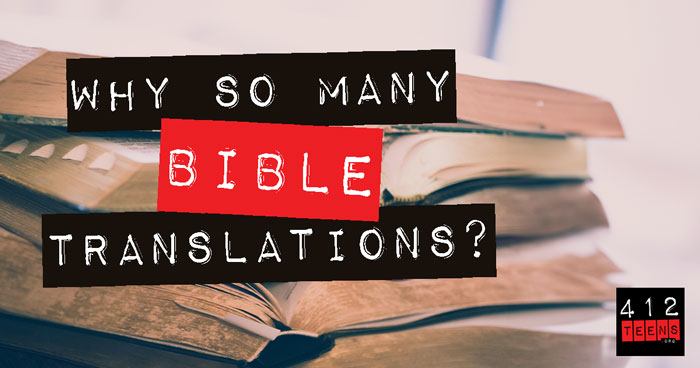How did we get different Bible translations?

If you've ever really looked at a selection on Bibles, you may have seen some of these letters: NIV, KJV, NKJV, NLT, NASB, CSB, ESV. They might seem like a secret code, but they're actually abbreviations for several different popular Bible translations.
The Bible is a compilation of 66 books written by 40 different authors over a period of about 1,500 years, but there is complete unity in the message of the Bible—from Genesis to Revelation. The Bible is a message given by God to us so that we might know Him better. It's a record of what He has done to provide the way of salvation and glorify His name. But how did we get from the original Word of God to all the different translations we have today?
Inspiration of the Bible
Let's start at the very beginning with the very first autographs. Now, I'm not talking about the signature of some famous person. The term "autographs," when referring to the Bible, means the original books penned by the original writers of the Bible. These autographs were "God-breathed" (2 Timothy 3:16; 2 Peter 1:21). This means that God divinely directed the human authors of Scripture so that what they wrote down would be free from error and would be exactly what God wanted, while still allowing the personality and writing style of each author to be expressed in what they recorded.
The official term for this truth called "the doctrine of inspiration and inerrancy." The Bible is not just merely an idea from God. It's literally "God-breathed," meaning "coming forth" from God or a result from God.1 This is why we call the Bible "God's Word" and treat it with such respect. It's just not a messenger speaking on God's behalf—it's God's direct message to us. Only the autographs (original documents) were completely inspired, "breathed-out," by God and without error.
Preservation of the Bible
While there are no surviving original autographs of Scripture today, that doesn't mean that the Bible we're reading today isn't God's Word. Since God is all-powerful and desires to communicate with us, it makes sense that He has the power to protect and preserve His Word.
So "inspiration" refers to the process by which the original documents were composed, and "preservation" is how we know we have a reliable copy/reconstruction of what the authors first wrote. For most ancient documents (not just Scripture), whether it's works of poetry, records of history, literature, or religious works, the original autographs have not survived to this day. This is because many of these documents were written on parchments or animal hides that have disintegrated or been destroyed in the past millennia.
Even though the original writings are not available to us today, we can still be assured that the authors first wrote with considerable confidence due to the plethora of intact manuscripts that are available. Manuscripts are hand-written copies of a document. Historical scholars compare the discovered manuscripts to one another. They look for similarities and differences. The more manuscripts there are and the more similarities within manuscripts, the greater confidence scholars have that they are reconstructing an accurate copy of the original.
When it comes to the Bible, there are thousands of manuscripts available to use in demonstrating the accuracy of the preservation of God's Word. In addition, those who copied God's Word did so with great reverence and care. For example, the Jewish scribes that copied the Old Testament were so committed to accuracy that they would count the lines, words, and even individual letters in both the old manuscript and new manuscript to make sure that they matched. If there were even three mistakes in their new copy, they would not keep that manuscript and would start again.2
All these various proofs show us that God not only gave us His Word, but He has also preserved it for us to know it today. Learn more about the preservation of God's Word here: How can we know that the Bible we have today is a reliable record of the original writings?

Translations of the Bible
Now we get to our original question and the last step: translation. Many biblical manuscripts were written in Hebrew, Greek, and Aramaic, so while we might be able to have a trustworthy reconstruction of the original autographs, that wouldn't do us much good unless we knew how to read those specific languages. Not everyone has that knowledge or access, which is why we need translations.
The various translations we have today represent the efforts of different people/teams that have translated the Bible from its original languages into our own native languages and provided different perspectives within their translations.
Famous translators in history include Martin Luther (German) and William Tyndale (English) who translated the Bible into languages that everyday people could understand. The King James Version (KJV) was authorized by King James I of England in the 1600s, and it quickly became the standard for English-speaking Christians—even continuing to this day.
Unfortunately, one of the difficulties with the KJV is that it maintains its formal language style of the time and uses words like "thou," "thee," and "thus saith." This can be confusing to those unfamiliar with 17th century lexicon or whose first language isn't English. To help modern believers better understand God's Word, a team of Bible translators revised the KJV, calling it the New King James Version (NKJV), and replaced the older words with new ones that were easier to understand.
Different Ways to Translate
Other Bible translations come from different linguistic teams seeking to meet different needs in translating the Bible. For example, some teams have translated the Bible using thoughts or phrases, rather than word-for-word translations. If you speak more than one language, you know that sometimes the sentence structure doesn't match exactly between languages. Often when you translate something word-for-word, you risk an awkward flow that may not make as much sense. Instead, you would translate the phrase/meaning rather than the exact words. That said, if you DO translate something word-for-word, you can better preserve the intended meaning—even if there's a bit of additional interpretation required on top of reading the translation. So there's merit to both types.
Popular word-for-word translations are the New American Standard Bible (NASB) or the English Standard Bible (ESV), and the most popular thought-for-thought translation is the New International Version (NIV). Some translations such as The Message (MSG) and The Living Bible (TLB) use paraphrases to help give a wider perspective on passage of the Bible. While these can be a good supplement for helping better understand concepts, these translations shouldn't be used as a primary Bible study resource.
Which translation of the Bible is the best?
This is a hard question to answer because it's actually based on personal preference. What's "best" for one person may not be "best" for another. Ultimately, the best way to judge which translation is right for you personally is to test them and see which helps you understand God's truth best.
Most translations do seek to uphold the accuracy of the original text while communicating God's truth in ways that are understandable to us today. However, be alert because there are some versions of the Bible that purposefully omit or change things to fit a particular group or person's idea/agenda rather than being a pure translation of Scripture, or their translation is so loose that they lose the intended meaning of the text.
We should be vigilant about knowing whether a translation is faithful to the true Word of God by going back to the manuscripts to see the intended message. Don't be afraid to compare versions for better understanding and to verify that the translation is as faithful to God's message as possible.
God is so good to give us His Word! Even after thousands of years, His message has not been lost or corrupted but is available to us in so many ways.
"The sum of your word is truth, and every one of your righteous rules endures forever." —Psalm 119:160
REFERENCES: 1. Ryrie, Charles Caldwell. Basic Theology: A Popular Systematic Guide to Understanding Biblical Truth. Moody Press, 1999,pg. 78. 2. "Old Testament: Committed to Detail | Is the Bible Reliable?" Josh McDowell Ministry, youtu.be/SiPGwqCQdq0. Accessed 18 March 2022.
ALSO SEE:


TL;DR
Hearing about different Bible translations can be confusing, but here are three simple words to remember: inspiration, preservation, and translation. Inspiration means that the Bible is God's Word. It is "breathed-out" from God, meaning that it comes directly from Him (2 Timothy 3:16)—and not merely an idea from Him. After God's Word was written down, faithful believers meticulously copied the Scriptures. These copies are called manuscripts. While we don't have the original writings of the Bible today, these manuscripts can be used to accurately reconstruct a trustworthy copy of the original. God has faithfully preserved His Word for us through the millennia. To help us read and understand the Bible, gifted linguists have translated the manuscripts into English (and thousands of other languages) so that everyone can have access to God's Word. Some of these translations are word-for-word translations (like KJV, NASB, or ESV) and others translate based on thoughts/phrases (like NIV). God has not only given us His Word, but faithfully provided a way for us to read it today!

Writer: Hanna S.
Hanna loves spending time with kids and teens. She enjoys being detectives with them to investigate God's Word to discover truths to answer any questions. She is the co-author of a newly published apologetics curriculum for children and teaches one online for highschoolers-adults. To learn more about her ministry you can visit networkerstec.com. For fun, she likes to play Ultimate Frisbee, read historical fiction, and paint.
